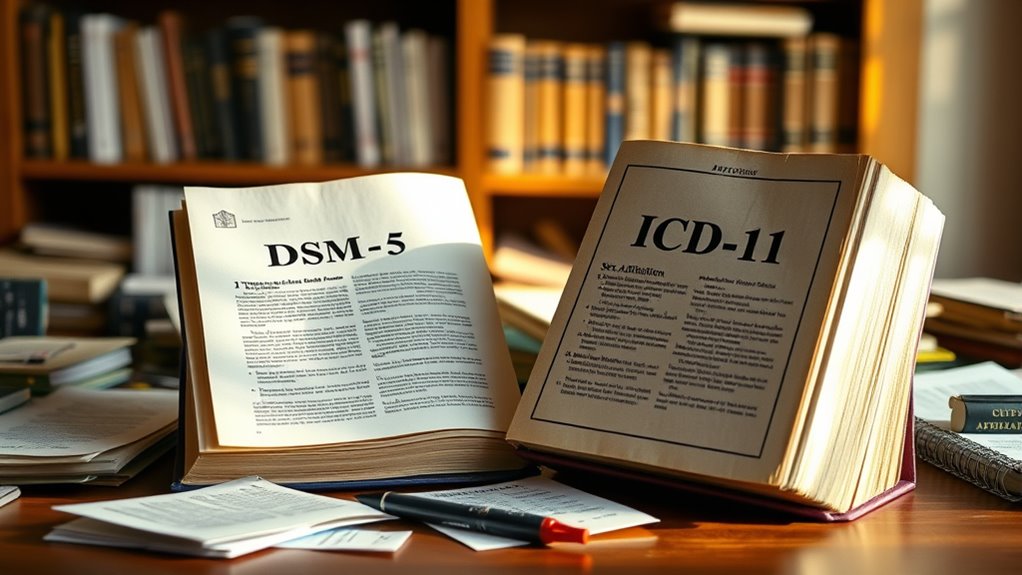The debate between DSM-5 and ICD-11 centers on whether sex addiction should be officially recognized. DSM-5 requires strong neurobiological evidence and is cautious about pathologizing behaviors, while ICD-11 takes a broader, culturally sensitive approach that focuses on behavioral and societal factors. Your understanding of this ongoing discussion will grow as you explore how scientific research and cultural norms shape mental health classifications.
Key Takeaways
- DSM-5 requires substantial neurobiological evidence to classify sex addiction as a mental disorder, leading to cautious inclusion.
- ICD-11 adopts a more flexible approach, recognizing compulsive sexual behaviors based on behavioral and cultural factors without strict neurobiological proof.
- The divergence reflects DSM-5’s emphasis on scientific rigor versus ICD-11’s focus on cultural perception and societal norms.
- Differences impact diagnosis, treatment approaches, and public perception, with DSM-5 being more conservative and ICD-11 more inclusive.
- The ongoing debate highlights the complex balance between scientific evidence and cultural sensitivities in recognizing sex addiction.

When it comes to diagnosing mental health conditions, understanding the differences between the DSM-5 and ICD-11 is essential for clinicians, researchers, and patients alike. In the debate over recognizing sex addiction, these classification systems take contrasting approaches, influenced by varying interpretations of neurobiological evidence and cultural perception differences. The DSM-5, published by the American Psychiatric Association, tends to be more cautious, requiring substantial neurobiological evidence before labeling behaviors as clinically significant. This means that for sex addiction to be officially recognized, there needs to be clear, consistent data showing brain-based changes or dysfunctions associated with compulsive sexual behaviors. Many experts argue that neurobiological findings, such as alterations in reward pathways or impulse control mechanisms, support the notion that sex addiction shares similarities with other recognized addictive disorders. However, others contend that such evidence remains inconclusive, leading to hesitations in including sex addiction as a formal diagnosis in the DSM-5.
In contrast, the ICD-11, developed by the World Health Organization, takes a more flexible stance, influenced heavily by cultural perception differences. It classifies compulsive sexual behaviors under the umbrella of “Compulsive Sexual Behavior Disorder” without insisting on the same level of neurobiological proof required by the DSM-5. This approach recognizes that perceptions of what constitutes problematic sexual behavior vary widely across different societies and cultures. For some, sexual compulsivity may be viewed as a moral or social concern rather than a mental disorder, while others see it as a genuine health issue. The ICD-11’s more inclusive criteria reflect an understanding that cultural norms shape how behaviors are interpreted and diagnosed. Consequently, clinicians in different regions may be more or less inclined to diagnose sex addiction based on local cultural perceptions rather than a universally accepted neurobiological marker.
This divergence influences not only diagnosis but also treatment approaches and public perception. While the DSM-5’s cautious stance aims to prevent over-pathologizing, it can also hinder individuals seeking help for problematic sexual behaviors that don’t meet strict criteria. Conversely, the ICD-11’s broader classification may lead to increased recognition but risks pathologizing behaviors that are culturally accepted elsewhere. As the debate continues, both systems grapple with balancing scientific evidence and cultural sensitivity, highlighting the complex interplay between neurobiology and societal norms in mental health diagnosis. Recognizing the importance of cultural intelligence can help clinicians better understand how societal norms influence perceptions of mental health issues like sex addiction. Understanding these differences helps you appreciate why sex addiction remains a contentious and evolving issue within psychiatric classification frameworks.
Frequently Asked Questions
How Do Cultural Differences Influence Sex Addiction Diagnoses?
Cultural differences greatly influence sex addiction diagnoses because cultural stigma shapes how behaviors are perceived and reported. In some societies, admitting to sex-related issues may lead to shame, reducing diagnosis accuracy. Additionally, diagnostic variability occurs as different cultures interpret symptoms differently, affecting recognition and treatment. You should consider these cultural nuances to guarantee fair and accurate assessments, understanding that what’s seen as a disorder in one culture might not be in another.
Are There Effective Treatment Options for Sex Addiction?
Did you know that around 50% of individuals seeking treatment for sex addiction find recovery programs effective? You can explore cognitive-behavioral therapy, support groups, and outpatient programs for treatment efficacy. Many find success through tailored approaches that address underlying issues. Remember, recovery is possible, and combining therapy with support networks increases your chances of overcoming sex addiction and achieving lasting change.
How Does Stigma Affect Individuals Seeking Help?
Mental health stigma creates help seeking barriers that make it harder for you to ask for support. When society judges sex addiction negatively, you might fear judgment or shame, preventing you from reaching out. This mental health stigma can make you feel isolated and misunderstood, so you may avoid treatment altogether. Overcoming these barriers requires understanding that seeking help is a brave and essential step toward recovery and well-being.
What Role Does Technology Play in Sex Addiction?
Technology plays a significant role in sex addiction by making cybersex dependence and online pornography easily accessible. You might find yourself repeatedly turning to these digital outlets for comfort or escape, which can lead to compulsive behaviors. The anonymity and constant availability of online content make it harder to control impulses, increasing the risk of developing problematic patterns that interfere with your daily life and relationships.
Are Insurance Companies Covering Sex Addiction Treatments?
Did you know insurance coverage for sex addiction treatments varies widely? Some insurance plans do cover therapy and counseling, improving treatment accessibility for those affected. However, many providers still see sex addiction as a behavioral issue rather than a diagnosable condition, making coverage uncertain. You might need to verify with your insurer directly or seek out specialized programs that accept your insurance to ensure you get the support you need.
Conclusion
As you explore the debate, remember that only about 4% of adults are diagnosed with sex addiction, highlighting its rarity. Whether you lean toward DSM-5 or ICD-11, understanding their differences can shape your perspective on treatment and recognition. The ongoing debate underscores how evolving criteria influence millions’ lives. Staying informed helps you grasp how mental health classifications impact real-world outcomes, making this discussion more than just academic—it’s about supporting those who need it most.









